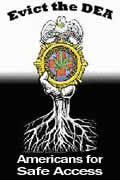Pot Busts At, On (or Near) the US Border
From N.O.R.M.L.
By Jeff Steinborn, Lawyer
Don’t touch my (hockey) bags, if you please – information for our Canadian brothers and sisters
MARIJUANA IS A DRUG OF SUCH POWER THAT IT HAS DRIVEN THE AMERICAN GOVERNMENT CRAZY. And now we’re trying to infect our neighbors to the north with this same disease. But the irony of the war on drugs is that virtually every step taken in its name enhances the profits of the drug dealers who don’t get caught. So it is with the intensifying efforts to stop marijuana from coming in from Canada. It’s so confusing. First it was Mexico, then Asia, now Canada. And all the time U.S. domestic growers complain: “I wish the border patrol would do a better job. These cut rate Canadians are destroying the market.”
Consumers, of course, applaud the Canadians. Competition is the American way, and it’s good for you. So, I respectfully offer to our brothers and sisters in Canada, and their friends south of the border, and any other brave soul who is thinking about running the border, these
MYTHS AND REALITIES: LEGAL ADVICE FOR CANADIAN (and other) POT SMUGGLERS
1. The Gauntlet: How evidence is gathered
My Uncle Sam would frown were I to tell you how to smuggle. I think, however, I am allowed to tell you of some of the devices out there to trick and capture you, if only in an attempt to persuade you to desist. Deterrence is, after all, one of the goals of law enforcement, isn’t it?
At authorized border crossings, in simple terms it’s the eye of the inspector, the nose of the dog, and the memory of the computer. If you look funny, smell bad, have been crossing too much, or are just not lucky that day, somebody will pull you over to “secondary” inspection. At the airport, and at other places where time allows the research, if your name has ever entered the computer for any suspicious reason, odds are customs will pull you over.
If you are near the border there a certain things that the border patrol will be looking for: one two or three males in a rental car or pick up truck, particularly at night, are almost certain to be stopped, or at least placed under surveillance. Hockey bags are considered nearly probable cause (lawful justification to search) without more.
- Once you’re suspected you’re fish in a barrel. Without a warrant, or even a shadow of a suspicion, the police, at the border can:
- Search your vehicle with a dog;
- Search its contents including locked luggage, with a dog;
- Search your person, at least to the extent of having you remove your coat and shoes.
- And, soon to come: warrantless dog sniffs of persons. This legal question is still up in the air.
At remote crossings where no one could possibly observe: There may still be such places. The only ones I hear about are the ones that are now guarded by wireless remote sensors that detect persons and vehicles. Although it is difficult for the sensors to distinguish between deer and people, they find a way, often by just putting the sensors high enough that 4-legged animals pass under them. Where there are sensors, there are officers standing by to respond. If you set off a sensor, it will relay to a pager in the possession of the border patrol officer who is closest. They are never far away. They will then come looking for you. If you are then seen by an officer who has reasonable suspicion that you crossed the border, and that whatever crossed with you is still in the car (or on your person if you’re walking) you may be lawfully stopped and searched. But, if the chain has been interrupted – if you have stopped and let someone or something in or out of the vehicle, then that suspicion evaporates, and then probable cause is required to search you. This, in a few words, is a summary of the complex law of border searches.
But wait! There’s one more: the “Terry stop,” named after one of the most important cases in the history of the definition of the “interface” between the police and the citizens they protect. When you step outside your home, you become subject to a Terry stop. Where a police officer has an “articulable” reasonable suspicion that crime is afoot, s/he has the power to stop you and ask what you’re doing. Once stopped, of course, the officer will find a way to develop “probable cause” to search you, and that’s it. People doing funny stuff at the or near the border will be stopped if they are seen. Period.
And then, of course, there are boats. While the law is slightly more complicated, as a practical matter, boats can be stopped, boarded and searched virtually anywhere, for any reason. In navigable waters, a Coast Guard safety inspection can be conducted at the whim of the officers.
What does this mean? It means that if you have enough brain cells to bang together to make a spark, you find someone dumber than you to carry the stuff across. It’s just too risky for clever folks. But the nature of prohibition is clear: there’s always someone dumb enough, or desperate enough, to take the risk. “Mules,” is what the government calls them. True “mules” get a little sentencing break. But I digress.
Unfortunately it is usually the mules that get busted, so, if that’s you, read on. You were probably busted at random at the official border crossing, or out in the woods because someone followed your trail through the snow, and then matched your boots to the prints, or because you tried to sneak over some suspicious farmer’s property or a remote sensor carrying something on the first run. A dry run would have been a good idea. It’s also nice if you don’t stick out like a sore thumb sneaking across some remote border at two in the morning. But if you were that smart you probably wouldn’t have to be reading this part now. In the courts in Bellingham, they process about a half dozen suckers like this each week. The same is true in Eastern Washington, and, so far as I know, and as one customs officer told me “from Maine to Blaine.”
But, if you haven’t been busted yet, maybe you should know a bit about the American Justice System before you decide to be a mule.
2. The Consequences: The American Criminal Justice System
It was, and, in some places still is, one of the best and fairest on the Planet. But it has been compromised, contaminated, and corrupted by the war on drugs. A few examples:
State Court:
If you are lucky enough to find yourself in the state criminal justice system in Washington, you aren’t too bad off. You have probably not been greedy and were caught with a relatively small amount – less than 50 pounds, more or less. There are probably no records of you having made repeated border crossings. The state constitution and state due process of law still receive some respect. You may be ok.
The trial process is reasonably fair, and for quantities small enough to keep you in state court the penalties are consistent with the offense: For first offenders, 0 to 90 days in jail, but with the potential for an “exceptional sentence up to 5 years if you are really bad. Fines are usually high – in excess of $5000. Most state judges properly view this as an economic crime and treat it as such. Big fines, not much jail. But it is a felony. If you’re a Canadian, that means you can’t come back to the U.S.
In the U.S. a felony is nearly an economic death sentence. You get most of your rights back, but discretionary niceties such as employment, insurance, or credit are often impaired. Boeing and Microsoft won’t even consider you. Many countries won’t let you in. So even at the state court level, it’s not something to undertake lightly.
The Federal System:
If the United States Government should take an interest in you – well, think about those kids in the car in Jurassic Park when the raptor broke loose. The Federal Criminal Justice System — “the feds” — is/are an insane, mindless, heartless, cruel car-crushing, home seizing, family-destroying monster out of control. The federal judges, some of them the most accomplished dedicated lawyers[1] in their communities, have been rendered toothless by a series of legislative and appellate judicial decisions that have given the prosecution – the police – everything on their wish list for the last 30 years. By way of illustration of my seemingly outrageous claims, here’s what the system looks like if you’re a Canadian citizen, caught in the jaws of the Feds, and a few bits of advice to go along with the view.
The arrest: At a regular border crossing, it’s pretty tame. But if you get caught out in the woods, look out! There’s no one there to watch. You are at the mercy of the officers. Most of them are pretty civilized, so if you mind your manners, you probably won’t be injured. But don’t flunk the “attitude test.”
And then there’s statements made in a panic to try to make a desperate situation better. There’s one more important thing to remember. “Just say ‘no’”. Don’t talk. Whatever you say will be re-written and enhanced until it suits the officers’ needs. So shut up. Shut up. Shut up. You can say “oh shit,” or, “excuse me officer, do you have any toilet paper?” But that’s about it. This is so important. When the police put words in your mouth, you have to confront those words at trial. This means you have to take the stand, giving up your important right to remain silent, so that you can tell the jury “I never said that!” Good luck.
After the arrest, within a very short time, you will be interviewed by a person from “pretrial services” regarding your personal data. The rule here is simple: say nothing even to the pretrial services person until you and your lawyer have had the time to talk about it. If you don’t have a lawyer, one will be provided for you. Don’t scorn the Federal Public Defenders, and don’t ever call them “pretenders.” Some of these folks are the very best and the most dedicated.
Shortly after that, you will find yourself in court, before a very polite United States Magistrate. Virtually every U.S. Magistrate in my district is a former prosecuting attorney. (That’s what we call “crown counsel” in the United States.) You are entitled to a “preliminary hearing” at which the Government must present evidence (hearsay is o.k.) establishing grounds to hold you for trial. This doesn’t take much, but it’s your one chance to hear the evidence against you. If your lawyer wants to waive it, or objects to any testimony at that hearing, discharge him or her immediately – before they ask another question or take another step on your behalf. I know this is a serious radical move, but I can’t think of any reason other than total ignorance to pass up your one chance to find out what evidence the government has.
You are also entitled to a “detention hearing.” If you are charged with more than 50 kilograms (including all the runs they think you might have made in the past) there is a presumption that there will be “no conditions of release that will assure your attendance at trial.”
If you’re from Canada, it’s tough. The odds are you won’t get out. That’s right. Usually no bail, even for two-bit marijuana cases. There are some exceptions, but not enough to write about. Any cash you want to spend is subject to a “Nebbia” hearing, at which you will be required to demonstrate with clear evidence that your cash is not the fruit of a crime. If you guess wrong, they may just take the money and keep it.
The most effective bail in the federal system is the home of a relative who owns little else. The courts figure you won’t leave your parents or your children without a home. But this is rare, even for American citizens charged with drug crimes in Federal court. There is a legal presumption of “detention” – no bail – for most drug offenses. Less than 50 pounds of marijuana doesn’t carry this presumption officially, but even then it’s very rare for a Canadian to make bail on a pot charge.
So you spend your pretrial time in some jail or detention center. Here in Seattle we call the new place the “Seatac Gulag.” It’s not because of the way they run the place, but because of what it’s used for. It’s well-run and really very civilized for a prison. You won’t be raped or beaten there, and the staff seems quite good, even progressive, but you won’t need your shades or your slicker. And they can be petty. Here’s one example. One Canadian client of mine can’t read without his reading glasses. They were taken from him when he was arrested. So he can’t even read the charges against him. His wife went to the U.S. Marshall’s office where they gave her his glasses. She took them to the prison and delivered them to my client’s counselor. She refused to give them to him because he had not followed the proper procedures. As of this writing, he’s been in custody for three weeks and still can’t read the charges against him. (There was a form he was required to send to Canada, which, in turn had to be returned to the prison by his wife, in the same package as the glasses.) In other words, this is not a hotel you will like. Pettiness abounds.
To summarize, in the area of pretrial release, it is fair to say that most offenders charged in Federal court start serving their time the day they are arrested.
But, before we get to the sentence, — “’No, no!’ said the Queen. ‘Sentence first–verdict afterwards’”[2] – let’s talk about the trial process – something that is used so rarely in Federal drug cases that even the most active Federal defense attorneys often try only two or three cases in a year. It’s because of the trial process and all of the incredibly coercive powers the feds now have. (I thought we only gave them limited powers. Where the hell did all this power come from? But I digress)
Prior to the actual trial, it used to be that some folks would get off on what many mistakenly refer to as “technicalities.” As my mother used to say, “the constitution is not a technicality!!” Dismissal of a case on constitutional grounds is pretty rare, nowadays. If a police officer thought a search warrant was good, it was good. That’s the “good faith exception” to the warrant requirement.
Warrantless searches conducted anywhere but in the middle of a private residence always seem to find some justification. So don’t expect to get off because the arresting officers used the Bill of Rights as toilet paper. If it helps to convict you, the evidence is probably coming in.
Then there’s the trial process itself. We call it “trial by ambush” because the United States Government (unlike the state governments) has no duty to disclose its witnesses, much less to make them available for interview. Where you’re caught with the goods, this doesn’t matter much. You know what the evidence is against you. But if you’re charged with conspiracy (from the Latin verb meaning “to breathe together”) you only guess who the witnesses are against you. And what lies they may tell – that often doesn’t come out until shortly before the witness takes the stand to testify against you.
The government has all the advantages in federal court. Government witnesses are given huge sentence reductions, large cash payments, freedom for their loved ones — even new identities and new lives in exchange for their testimony. Cooperation is the only way out of the incredibly long sentences. The rush to “get on the bus” to give evidence against virtually anyone of interest to the government is a silent stampede. Every now and then a jury is offended that the testimony of a low life scum bag witness has been purchased by the government with the dearest of all currencies but that’s rare. Meanwhile, the defense attorney who tries to purchase testimony with any currency, much less that ultimate one will be promptly suspended from practice.
That’s why most discussion among federal defense lawyers centers on sentencing issues and how to avoid the incredibly harsh results of the Sentencing Guidelines and the mandatory minimums. We have used the word “draconian” to describe our sentences for so long that it has lost all meaning. Without boggling your mind with the technicalities of this Byzantine system, its main point is that the prosecutor determines the sentence by what crime is charged, after which the judge can only evaluate categories and rubber stamp predetermined sentences. Yet here is where most of the discussion goes on. Sadly, in many cases it’s a discussion of whether the sentence should be a mandatory minimum 20 years, or the slightly lesser guideline sentence of 18 and one half.
Here are some specifics regarding marijuana sentencing under federal laws. At the state level, the laws change from state to state. For information on those laws try http://www.norml.org/legal/state_laws.shtml. Under federal laws the standards are pretty extreme: 100 plants or 100 kilos = 5 years. 1000 plants or 1000 kilos = 10 years. There are a few exceptions, but they are far too complicated to explain. (For more details visit the chapter on sentencing at http://www.potbust.com/ and the links I have placed there.)
And don’t look to the appellate courts for a safety valve. The U.S. Supreme Court has recently made such shocking rulings as the following:
United States v. Ursery, 518 U.S. 267, 116 S. Ct. 2135, 135 L. Ed. 2d 549 (1996), ruling that when the government takes everything you own because you have committed a crime with it or to get it, you are not being punished.
Herrera v. Collins 506 U.S. 390 (1993), actual innocence is not grounds to review a death sentence if the defendant already had a “fair trial.”
United States v. Watts, 519 U.S. 148 (1997), ruling that a defendant may be punished for conduct of which the jury acquits him. And there are lots more where those came from. Sometimes we have to medicate ourselves just to read some of the new drug cases decided by United States Courts.
There is one way out of these insane sentences. You can cut your sentence at least in half by cooperating. This means providing the government with “substantial assistance” in the prosecution of another. We call it a “5K” motion, after the section of the United States Sentencing Guidelines which creates it. But if you want to do that, don’t read this, and don’t call me.
3. What to do if caught
There are only two choices after being caught. You can cooperate (snitch) and do what the police ask you to do. You can usually make someone else pay for your mistakes. Or else, you can fight the case and take what comes. Or, you can start by fighting and later decide to give up and cooperate. But, no matter which path you choose, the first step is always the same: Shut up and call a lawyer. Neither admit nor deny anything without your defense attorney at your side. This is very difficult, but so important. Everybody seems to feel a need to explain themselves to the very same officers who have them at their mercy. And, if you don’t start to babble expect to be bullied, terrorized, lied to and manipulated. That’s what narcotic officers are trained to do. To succeed as a narcotics officer, you have to be good at this. So if they are busting you, you can assume they’re good at it.
In Singapore, they have a system of counsel that it much more straight-forward: You have the right to counsel if counsel would not impede the investigation. But, until you confess, counsel will impede the investigation. We have a similar system here, but it’s not spelled out quite so clearly.
If you reside in the U.S., as a part of the initial rush, expect a certain amount of bullying of your friends and family. Your house may be searched. Your mom’s house may be searched. Your bank accounts will be frozen. Your home, your car, your boat, and maybe even your lawn mower will be seized. Maybe even the sox and underwear out of your bedroom. Be ready to deal with this very traumatic loss emotionally without turning into a blubbering fool. The entire system is designed with one goal in mind: to wring the most terrible testimony from terrified and confused defendants – testimony that destroys their friends and family, and, in the long run even them. If you weren’t ready for this kind of pressure, you’ve got no business in the drug business.
In any event, there are many pressures in the first few hours of your arrest – all directed at getting you to become an informer. They hold out the prospect of bail, freedom for you or your loved ones, and they threaten with the loss of everything – even your children.
But, the sooner you call a lawyer, the sooner this torture stops. Your lawyer should know how to act swiftly to legally protect you and your friends and family from bullying, and your assets from seizure or theft. In some cases it is necessary to “freeze” the evidence before the government can massage it or destroy it.
Even if you want to cooperate, at the moment of the bust, you must be strong. Whether you intend to cooperate and inform, or to fight it out, you must have a lawyer immediately to begin either course. Don’t play any cards until you’ve had a lawyer advise you. The police have heard it all a thousand times. They believe none of it. But they’ll still milk you. They are trained to get you to help them through lies, trickery, false friendship – nothing is beneath them.
So get a lawyer. Immediately. Sorry if this seems redundant, but it seems to be difficult advice to remember in a crisis. But you must. This is not just some lawyer’s self-serving crap. Ask anyone who’s been arrested. In too many cases, until your lawyer shows up, you are a victim to be bullied; a target to be threatened; a source to be exploited; a mouth to shove words into. If you are lucky enough to be arrested by professional cops who don’t stoop to this sort of thing, even they will respect a courteous request to see a lawyer.
How to find a lawyer. If you’ve crossed the border without researching this one, you really are lame. Sorry for the insult but, what were you thinking of? In any event, it doesn’t matter. If you’re that dumb, you’re probably too broke to afford a lawyer anyway. $25,000 is not an unusual retainer for those lawyers who are familiar with the federal criminal justice system. At the state level you might get by for $5,000 if you just want to plead guilty. But it’s ok if you can’t afford private counsel. The often abused Public Defenders are among the very best lawyers anywhere. Their standards are high; their training is excellent. The sometimes higher paid members of the “private bar” often call on them for advice. So that’s a good place to start. You have to judge lawyers for yourself. Look at their abilities, and, perhaps more importantly, their interest in you and your marijuana case for yourself.
If you’d prefer retained counsel, some of whom have a bit more time to hold your hand and explain what’s happening to you, make sure you select one that knows the system, be it federal or state, and who understands how marijuana cases are different from any other criminal defense. NORML (The National Organization to Reform Marijuana Laws) is on the Web at http://www.norml.org/. Their state-by-state list of lawyers is a very good place to start. Or you can call their Washington D.C. office 202 583 2200. If they do you a favor, send them a contribution. Another good place to look is former public defenders who have just set out in private practice. They are usually well-trained and motivated. But you may have to explain to some of them why it is that marijuana cases are different than all others.
Pot bust victims should approach with great suspicion any defense attorneys who advertise themselves as “former prosecuting attorneys.” Among them are some very fine lawyers who will go to the wall for their pot clients. But if they quickly tell you to cooperate in a marijuana case get a second opinion — preferably from a career defense attorney.
If you’re busted and just reading this now, sorry, but you shouldn’t have undertaken this mission without a phone number of a lawyer you have researched and believe to be qualified. And you should have the retainer put away. Although most successful lawyers will not take “retainers” from persons not actually in need of representation, most will talk to you and tell you what their retainer would be, and what terms they will accept.
You should also know that any United States lawyer (or any person in the United States, for that matter) who takes more than $10,000 in cash for any one case in any one year must file a “currency transaction report” with the IRS. Further, any person who carries more than $10,000 into or out of the United States is required to report it to Customs. They love to bust you for this and take your money.
This is not a problem if you are paying the bill from assets or credit for which you can account. I mean account not just some jive story that the cops have heard a hundred times. “I never used banks.” “I kept it in a can.” So on. If you plan on having a friend show up at a lawyer’s office with a suitcase full of cash that you can’t explain, you will probably have to content yourself with lawyers who aren’t even smart enough to keep themselves out of trouble.
Even the best lawyer can’t improve much on the rest of the program. If you’re caught “red-handed” and the search is good the only significant remaining question is often sentence. Yes, it is possible to go before a jury and hope that somehow that one juror who will not convict for marijuana will sneak on to the jury. The trouble is that people like that are usually honest. Honesty is not a survival trait for most jurors. The prosecutor kicks them off the jury as soon as they show their true colors. In Federal court, where the judge usually picks the jury, it’s scary. I once worked with a group of nationally famous lawyers in a criminal case in 1970. Despite their best efforts, the judge picked a jury of 12 plus 4 alternates, none of whom would admit to having any opinion about the war in Viet Nam. I didn’t make this up.
So, it’s not like Canada, where, I understand, acquittals of clearly guilty pot people are fairly commonplace. Here in the land of the free and the home of the brave I would equate the odds on this as somewhere between hitting an inside straight and finding a silver dollar rolling uphill against the wind.
CONCLUSION
If you don’t live in the United States you probably can’t imagine the cruelty of the war on marijuana. Nor can you imagine the Alice in Wonderland quality of some of our criminal laws and procedures. When drugs are involved reason and civility flee from the justice system. So don’t think for a minute that because the drug war is fatally flawed, because there is nothing wrong with the responsible adult use of marijuana, because our Canadian neighbors have gone well down the path of intelligent tolerance, because the American public has voted overwhelmingly to make marijuana a medicine – don’t be lulled into believing that it’s safe to bring this magnificent herb into the United States. Unless you are ready to do some serious prison time in a system that thinks weight rooms are a luxury too good for prisoners, don’t do it.
I hope this piece is of some value to you. This and more is available at http://www.potbust.com/. Use it, copy it, do some good with it. Save a few good folks from being crushed by their beastly neighbor to the south.< font>



 Button Ads!
Button Ads! 




